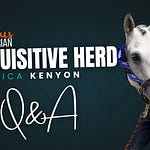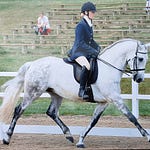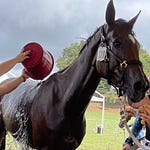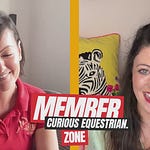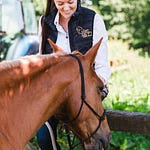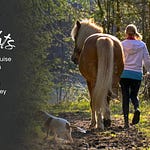What if the most profound breakthrough in your equestrian journey came not from getting on your horse, but from choosing never to ride again? We meet Claire and explore the transformative power of stepping away from traditional expectations and discovering what horses truly offer when we meet them on the ground.
This Week's Deep Dive 🎧
Guest: Claire Artis, equestrian and founder of Claire Artis Horsemanship
Background: Over 30 years of horse experience, former professional, now advocates for unridden horsemanship
Key Topics:
• The journey from "broken to ride" to understanding trauma responses in horses
• Building trust through psychology-based horsemanship rather than traditional methods
• Creative groundwork alternatives that challenge horses mentally and physically
• Overcoming societal pressure to ride and finding freedom in choice
The Big Takeaway
Claire's decision to permanently stop riding Cloudy wasn't a failure; it was a liberation that opened doors to a deeper relationship than she'd ever imagined possible. When Cloudy shut down after a riding setback, Claire faced a crossroads: push through for her own goals, or honour what her horse was telling her.
Choosing her horse's wellbeing over societal expectations didn't end their partnership, it transformed it into something richer and more nuanced than anything she'd experienced in 30 years of riding. "I actually felt from that a huge weight had been lifted," Claire explains, revealing how our attachment to riding can sometimes limit rather than enhance our connection with horses.
Three Things That Stood Out
1. "I listened. I listened to all those little changes in her body language"
Claire's approach to trust-building centres on becoming fluent in equine communication rather than imposing human timelines. By watching ear position, nose tension, and subtle weight shifts, she learned to respect Cloudy's boundaries before they became explosive reactions. This skill transformed a horse who couldn't be caught into one who responds to the subtlest gestures.
2. The power of creative play over traditional training
From giant gym balls to tarpaulin obstacle courses, Claire discovered that engaging horses' natural curiosity through play builds confidence more effectively than rigid training programmes. Her approach turns everyday objects; water barrels, poles, tyres, into tools for mental stimulation that keeps both horse and human engaged and learning.
3. "We've got to get out of this mindset that because we can't ride our horses, it's the end"
Perhaps the most revolutionary insight is Claire's challenge to equestrian culture itself. She argues that our obsession with riding often blinds us to the rich possibilities of ground-based partnership, limiting both our horses' potential and our own growth as horsemen and women.
Deep Dive Analysis
The Trauma-Informed Approach to Horsemanship
Claire's journey with Cloudy illustrates how traditional "breaking" methods can create lasting psychological damage that manifests as fear, shutdown responses, and apparent disobedience. When Cloudy arrived supposedly backed but bolted at the sight of a saddle, Claire recognised that force would only compound existing trauma.
Her patient approach, spending eight months just getting Cloudy comfortable with saddling, demonstrates how healing happens on the horse's timeline, not ours. This challenges the industry's push for quick results and young horse training, suggesting we need to fundamentally rethink our expectations of what horses owe us and when.
Beyond the Binary: Redefining Equestrian Success
The equestrian world operates on a false binary: you either ride or you don't, and not riding somehow makes you "less than." Claire's experience reveals this thinking as not just limiting but actively harmful. Her herd of five unridden horses lives rich, engaging lives filled with mental stimulation, physical challenges, and deep human connection.
This perspective becomes particularly relevant as we consider aging horses, injured riders, young horses not yet ready for saddle work, and horses recovering from physical or psychological trauma. Claire's approach offers a roadmap for maintaining meaningful partnerships beyond the traditional riding framework.
The Psychology of Pressure and Permission
One of the most striking aspects of Claire's story is her admission that she "cried for a while" when first contemplating a life without riding. This honest acknowledgment of grief reveals how deeply embedded our expectations around horses are—and how liberation often requires mourning what we thought we wanted.
The pressure to ride comes from multiple sources: livery yard conversations, family expectations, social media, and our own internalised beliefs about what constitutes "real" horsemanship. Claire's journey shows that permission to step away from these expectations often unlocks creativity and connection we never knew was possible.
Questions for Reflection
What would you discover about your horse if you took riding completely off the table for two months? Claire challenges every rider to experiment with this radical reset, suggesting that the insights gained will enhance even those who choose to return to the saddle.
How much of your desire to ride comes from genuine passion versus societal expectation? This uncomfortable question gets to the heart of authentic horsemanship—are we riding because we love it, or because we think we should?
What possibilities might you be missing by focusing primarily on ridden work? Consider the horses in your life who might benefit from a different approach—the anxious mare, the shut-down gelding, the young horse everyone's eager to "get going."
Join the Conversation
What resonated most with you from Claire's journey with Cloudy? Have you ever felt that pressure to ride when perhaps your horse was telling you something different? Share your thoughts in the comments below.
Follow Claire's ongoing journey with Cloudy and her herd on Instagram and Facebook @ClaireArtisHorsemanship




